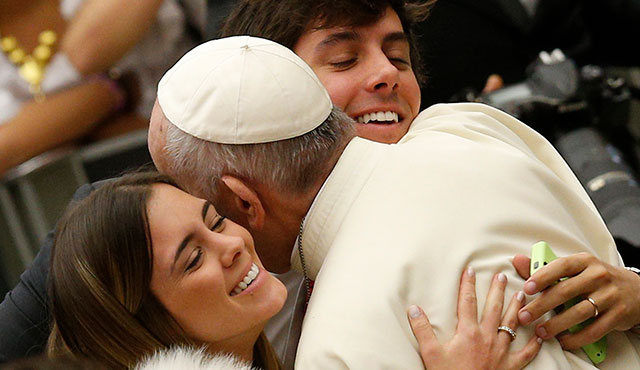What is love? The answer isn’t so simple.
“Love is a powerful emotion that a human being can experience and we only have the one word in the English language to cover a whole multitude of things,” said Claire Frazier-Yzaguirre, a licensed Catholic marriage and family therapist who, with her husband, Dr. John Yzaguirre, run Irvine-based Thriving Families and are authors of “Thriving Marriages: An Inspirational & Practical Guide to Lasting Happiness.”
She explains that love is a 3-stage process.
“Love is very powerful but it has to be matured so that we can grow our unity through the ups and downs of life. We are not just pictures in a frame on a wall. We are living, breathing people,” she said.
The first stage is sentimental love, when two people are attracted to each other and find the other exciting, interesting, beautiful, intelligent or spiritual. This honeymoon phase, although necessary, eventually fades and challenges will emerge.
Some couples struggle with managing the stress of a career, finances or raising children. Other couples begin to realize differences in perspectives or that one person does things that disappoint the other.
Frazier-Yzaguirre points out that some couples break up at this point because they think that their differences are too great.
“Sometimes it’s not so much the differences but it’s how they handle the differences. They need instruction along the way on how to handle them. A lot of couples get married, [and] a couple of years into the marriage they’re not really feeling that good about each other and they’re starting by the fourth year looking for a way out. We know that’s when some of the divorces begin,” she said. “The dust has settled and now life is lunging at you full throttle ahead. So now the question is, how do we grow our relationships and marriages at the speed of life?”
This second stage involves growing young love into unconditional love, where couples grow the skills necessary for managing stress, anger, and anxiety and remove toxic thoughts that get in the way of understanding the other person.
“If you are having a bad day, if you make a mistake, if a couple argues, then you have to develop those unconditional love muscles. That’s when the true work of love begins,” she said.
The Yzaguirres have been teaching seminars and ministering to thousands of couples in California over the last 30 years on how to grow skills to strengthen marriage and unity. Among the skills taught to couples is empathy for one another, communication, conflict resolution, forgiveness and developing self-care skills so that each person receives the gift of a healthy mate.
For Christian couples, although growing these skills in relationships is essential and important to strengthening unity, there is a higher calling.
Every year, on the second Sunday of February, Christians celebrate World Marriage Day, which honors husbands and wives as the foundation of the family and highlights their commitment to married life. Christians are called to develop the spiritual component to the psychological skills of empathy, communication self-care and forgiveness.
In Galatians 2:20, the apostle Paul perfectly explains this calling – “I have been crucified with Christ; and it is no longer I who live, but Christ lives in me; and the life which I now live in the flesh I live by faith in the Son of God, who loved me and gave Himself up for me.”
Furthermore, the profound actions of St. Joseph choosing to obey the will of God above his own desires is another model of courage and sacrifice that demonstrate why Christians must love one another.
“If we also have the spiritual component of why we should love, the motivation for us to love the other person who is not being lovable, it’s very important thing to grow our unity so that we are actually loving Jesus in the other person and be aware of the presence of Jesus in them,” said Frazier-Yzaguirre.
The third stage of love is mutual love, the core of which is Jesus’ teaching of “love one another as I have loved you.”
“Mutual love is very strong, lasting, robust love,” she said. “When we are able to love each other. That’s what God wants more than anything and that involves the ability for both people to be practicing mutual love. To do the necessary things. When we love one another through the power of the Holy Spirit, we are creating a home for Jesus in our relationship. So when people look at us, they are seeing what we are developing in showing the gospel in a very powerful way. It doesn’t mean we are perfect. It just means that we know what to do. We have a model for Christian unity and the motivation because we are growing our spirituality.”

